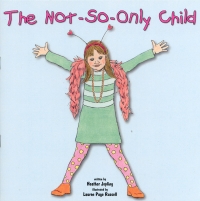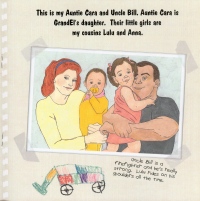| ________________
CM . . .
. Volume XIII Number 20 . . . .May 25, 2007 
 |
The Not-So-Only-Child.
Heather Jopling. Illustrated by Lauren Page Russell.
Coburg, ON: Nickname Press (Box 454, 39 Queen St., K9A 1M0 or www.nicknamepress.com), 2006.
24 pp., pbk., $9.95.
ISBN 978-0-9780739-4-7.
Preschool-grade 4 / Ages 4-9.
Review by Vivianne Fogarty.
*** /4
|
| |
|

When viewing the variety of "photographs" of Larissa's family, readers come across these captions.
This is my Auntie Cara and Uncle Bill. Auntie Cara is GrandEl's daughter. Their little girls are my cousins Lulu and Anna.
Uncle Bill is a firefighter and he's really strong. Lulu rides on his shoulders all the time.
This is my half-brother Ryan and his mummies Vivian and Carolyn.
My Daddy helped Vivian and Carolyn make Ryan, so my Daddy is Ryan's
Daddy too. But Ryan doesn't call him Daddy, he calls him David.
Heather
Jopling has written three books to highlight and celebrate the
diversity of various family combinations: The Not-So-Only Child, Monicka's Papa is Tall, and Ryan's Mom is Tall.
In this trio of books, Heather writes about her own family make-up and
other families that she and her husband have helped to create. They are
distributed by Nickname Press, her own independent publishing company.
In The No-So-Only Child,
Jopling writes in the first person from her six-year-old daughter's
(Larissa) point of view. In this book, we learn that an only child is
not really an only child at all. Besides her own mother, father and
pets, Lareissa goes on to present a very diverse and large extended
family. Amongst the family members, we learn about her traditional
grandmother and grandfather on her maternal side. On the paternal side,
we meet the grandpa who has a new female partner. The paternal
grandmother (GrandMer) is in a relationship with another woman called
GrandEl. Various aunts and uncles, portraying different ethnic and
racial backgrounds, are introduced along with their children. Aunts and
uncles, both single and without children, also make up part of the
extended family. Close female friends, called Auntie, also make it into
the family photo album. Last but not least, Larissa introduces us to
her half-sister and half-brother. Both of these children have same-sex
parents, one set male and the other female. As a finale, everyone's
pets are included.
 The
basic theme of this book is that this child may be an only child, but
she is definitely not lonely. With a vast array of family members, it
is obvious that this child has many close and positive relationships.
She is also intrinsically involved with a wide diversity of family
combinations, both traditional and non-traditional. The
basic theme of this book is that this child may be an only child, but
she is definitely not lonely. With a vast array of family members, it
is obvious that this child has many close and positive relationships.
She is also intrinsically involved with a wide diversity of family
combinations, both traditional and non-traditional.
Above the illustrations of the family members, repetitive text, such as
"This is my Grandma," is written in a bold font throughout the book.
Below the illustrations, more detailed captions are provided about the
family members written in a child-like font.
The various members of the extended family are presented in pencil
crayon and ink illustrations in the form of "photographs." The
photographs depict people involved in a variety of activities,
including sports, music, as well as goofy and more formal poses. The
main message in the photographs is warmth and happiness Although the
illustrations depict the family members adequately; they do not have a
professional look and appear somewhat flat. The child-like doodles
around the photographs add an interesting contrast to the photographs.
They are done in crayon, markers and pencil crayon. A more professional
cover and binding might also add to the visual appeal of the book.
I think Jopling's book will help educate and encourage acceptance
towards the diversity of family relationships seen in today's society.
This book presents this child's extended and diverse family in a very
normal, accepting fashion. If we want today's children to be exposed to
diversity in relationships and to accept people for who they are, this
book will help support this goal. Jopling's open and honest, child-like
style will help expose children at an early age that differences and
diversity in family relationships are to be cherished and celebrated
like all other positive
relationships.
Recommended.
Vivianne
Fogarty is a teacher-librarian at Ecole Dieppe in Winnipeg, MB. She is
also completing her teacher-librarian diploma through the University of
Alberta.

To comment
on this title or this review, send mail to [email protected].
Copyright � the Manitoba Library Association. Reproduction for personal
use is permitted only if this copyright notice is maintained. Any
other reproduction is prohibited without permission.
NEXT REVIEW |
TABLE OF CONTENTS FOR THIS ISSUE
- May 25, 2007.
AUTHORS |
TITLES |
MEDIA REVIEWS |
PROFILES |
BACK ISSUES |
SEARCH |
CMARCHIVE |
HOME |

 The
basic theme of this book is that this child may be an only child, but
she is definitely not lonely. With a vast array of family members, it
is obvious that this child has many close and positive relationships.
She is also intrinsically involved with a wide diversity of family
combinations, both traditional and non-traditional.
The
basic theme of this book is that this child may be an only child, but
she is definitely not lonely. With a vast array of family members, it
is obvious that this child has many close and positive relationships.
She is also intrinsically involved with a wide diversity of family
combinations, both traditional and non-traditional.